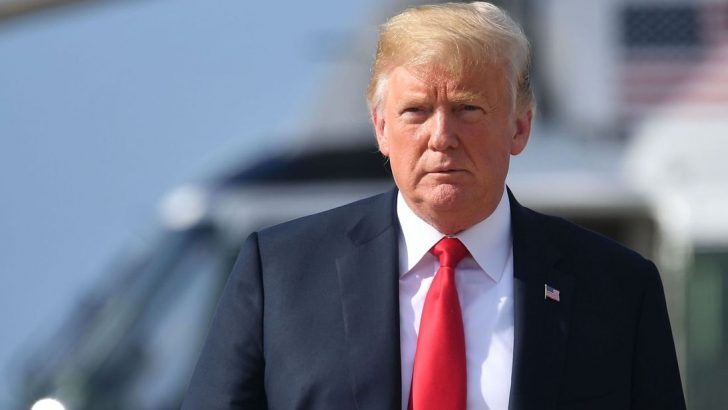You’ll struggle to find anything about it in the Irish media, but last Friday’s March for Life in Washington was impressive by any standards.
March for Life (EWTN’s live coverage) was broadcast most of the afternoon and evening. Probably the most prominent part of the event was the address by President Trump – the first time an American president has spoken at the March for Life, now in its 47th year.
I’m not a Trump fan but to be fair it was an impressive pro-life speech, delivered with ease and confidence. He was generous in his praise of the pro-life movement – “led by strong women, amazing faith leaders and brave students”.
Of course there was a political context, related to the forthcoming election. When he first appeared there were chants of “four more years” and he was scathing of extreme pro-choice positions taken by “nearly every top Democrat”.
In the studio discussions Matthew Bunson, Executive Editor at EWTN, was positive about Trump’s appearance, despite “quibbles”, but also noted that there was “political calculus”. He believed that Trump’s numbers were being held up by faithful Catholics for whom the right to life issues were central.
I can understand the US pro-life movement being enthusiastic about Trump’s attendance, and the good side of his legacy will be the work he has done to limit the reach of abortion, especially in defunding and the appointment of judges – perhaps Roe vs Wade might be reversed in time for the 50th March for Life?
However there are dangers in too close an alliance. I was tickled by the choice of music played at the event. As Trump arrived a Rolling Stones song blared “don’t play with me, ‘cause you’re playing with fire” and as he left another Stones track repeated “you can’t always get what you want”. Delightful choices!
Not unrelated, last weekend there was much coverage of the 70th anniversary of the liberation of Auschwitz. Of course you’d be scalded in the public domain for linking that to the massive death toll from abortion, but like it or not there are disturbing parallels.
Discussion
There was an interesting discussion on that anniversary on Sunday Sequence (BBC Radio Ulster), with contributors concerned that it could happen again. I agreed with Rabbi Jonathan Romain that a society was in trouble “when any majority says to a minority ‘you are less human than us”’ but I thought he went too far in suggesting that “perhaps we need to reconsider faith schools”. I noticed no public scalding for such an ill-judged association.
No doubt there was anti-Semitism in Christian circles before the war (stupid really, seeing as how Jesus, Mary and Joseph were Jewish) but faith schools also produced the heroes that stood up to the Nazis, and faith schools that take their vocation seriously encourage love, compassion and understanding.
On the same show there was a fascinating discussion on science and religion. Prof. David Wilkinson, physicist, Methodist minister and author of a new book on Stephen Hawking, believed that science and religion were not in conflict but in conversation. He had great admiration for Hawking as a physicist, but suggested he was on shakier ground when he wandered outside of his own field into more theological matters. He also suggested that the many scientists who believed in God didn’t get the same media limelight as those who did.
The US comedy Young Sheldon also hypes up the alleged conflicts between religion and science, with Sheldon the science-obsessed atheist child sometimes dismissive of religion. Yet the show does show warmth towards its religious characters, especially Mary, Sheldon’s mother who is kind, loving and fiercely protective.
In an episode on E4 Wednesday, Sheldon was overwhelmed by his father getting him to keep a secret from his mother. The burden was too much and he turned to his Catholic friend Tam, whose family is Vietnamese. Tam told him about Confession which Sheldon thought was “a great idea”, so he wanted Tam to hear his Confession.
After puzzling it out Sheldon reckoned that if he wasn’t a Catholic and Tam wasn’t a priest, it made “perfect sense” to proceed! After the ‘Confession’ Sheldon felt “a weight lifting off” his shoulders and “felt like a new person”.
I’ve always thought the Sacraments made so much sense on a human level, but I wasn’t expecting to find this view validated from such an unlikely source!
Pick of the week
The Big Questions
BBC1 , Sunday, February 2, 10.30 am
Return of the live debate series on religious and ethical issues with Nicky Campbell.
True North
BBC1, Monday, February 3, 10.35pm and BBC2 Tuesday, February 4, 10 pm
Soul Singers: following the journey of members of the Belfast Community Gospel Choir as they prepare for their annual winter concert, exploring choir members’ stories.
All Walks of Life
RTÉ1, Friday, February 7, 8.30 pm
Paul Alford, born with a mild intellectual disability tells Mary McAleese about his fight to work in the community and have his own home.


 Brendan O’Regan
Brendan O’Regan Former president of the United States, Donald Trump.
Former president of the United States, Donald Trump. 